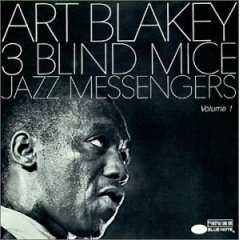With
others | - God Bless Jug and Sonny (Gene Ammons & Sonny Stitt, 1973)
- Left Bank Encores (Gene Ammons & Sonny Stitt, 1973)
- Something for Lester (Ray Brown, 1977)
- Slow Drag (Donald Byrd, 1967)
- The Almoravid (Joe Chambers, 1971–73)
- Somethin's Cookin' (Junior Cook, 1981)
- Broken Shadows (Ornette Coleman, 1971–72)
- Katumbo (Dance) (Johnny Coles, 1971)
- Giant Steps (John Coltrane, 1959)
- Up, Up and Away (Sonny Criss, 1967)
- The Beat Goes On! (Sonny Criss, 1968)
- This Is the Moment! (Kenny Dorham, 1958)
- Blue Spring (Kenny Dorham & Cannonball Adderley, 1959)
- It's All Right! (Teddy Edwards, 1967)
- Soul Trombone (Curtis Fuller, 1961)
- Smokin' (Curtis Fuller, 1972)
- Tangerine (Dexter Gordon, 1972)
- Generation (Dexter Gordon, 1972)
- Bush Dance (Johnny Griffin, 1978)
- Roots (Slide Hampton, 1985)
- The Quota (Jimmy Heath, 1961)
- Triple Threat (Jimmy Heath, 1962)
- Mode for Joe (Joe Henderson, 1966)
- Hub Cap (Freddie Hubbard, 1961)
- Here to Stay (Freddie Hubbard, 1962)
- The Body & the Soul (Freddie Hubbard,1963)
- Bolivia (Freddie Hubbard, 1991)
- Highway One (Bobby Hutcherson, 1978)
- Farewell Keystone (Bobby Hutcherson, 1982)
- Really Livin' (J.J. Johnson, 1959)
- J.J. Inc. (J.J. Johnson, 1960)
- Save Your Love for Me (Etta Jones, 1986)
- Advance! (Philly Joe Jones, 1978)
- Drum Song (Philly Joe Jones, 1978)
- Seven Minds (Sam Jones, 1974)
- Something in Common (Sam Jones, 1974–77)
- First Class Kloss! (Eric Kloss, 1967)
- Abbey Is Blue (Abbey Lincoln, 1959)
- Strings! (Pat Martino, 1967)
- From This Moment On! (Charles McPherson, 1968)
- Horizons (Charles McPherson, 1968)
- Caramba! (Lee Morgan, 1968)
- The Sixth Sense (Lee Morgan, 1968)
- The Mode (Sonny Red, 1961)
- Sonny Red (1971)
- Setting Standards (Woody Shaw, 1983)
- For Losers (Archie Shepp, 1968–69)
- Kwanza (Archie Shepp, 1968–69)
- Now Is the Time (Idrees Sulieman, 1976)
- Goodbye Yesterday (Lucky Thompson, 1972)
- Concert: Friday the 13th – Cook County Jail (Lucky Thompson, 1972)
- I Offer You (Lucky Thompson, 1973)
- Another Story (Stanley Turrentine, 1969)
- Up Front (David Williams, 1986)
|
|---|
